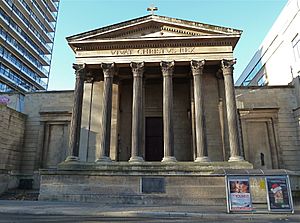St Mary on the Quay facts for kids
Quick facts for kids St Mary on the Quay Church |
|
|---|---|

Front entrance
|
|
| Lua error in Module:Location_map at line 420: attempt to index field 'wikibase' (a nil value). | |
| OS grid reference | ST 58599 73055 |
| Location | Bristol |
| Country | England |
| Denomination | Roman Catholic |
| Previous denomination | Catholic Apostolic Church |
| Website | St Mary site |
| History | |
| Former name(s) | Irvingite chapel |
| Status | Active |
| Dedication | Blessed Virgin Mary |
| Dedicated | 1843 |
| Architecture | |
| Functional status | Parish church |
| Heritage designation | Grade II* listed |
| Architect(s) | R. S. Pope |
| Style | Neoclassical |
| Groundbreaking | 1839 |
| Completed | 1840 |
| Administration | |
| Deanery | St Edmund of Abingdon |
| Diocese | Clifton |
| Province | Birmingham |
St Mary on the Quay is an important Roman Catholic church located in Bristol, England. You can find it right in the city center, on Colston Avenue, next to Beacon Tower. This church is special because it's the oldest Roman Catholic church built in Bristol after the time known as the English Reformation. It used to be looked after by a group called the Society of Jesus, but now the Divine Word Missionaries help run it. It's also recognized as a Grade II* listed building, which means it's a very important historical building.
Contents
History of St Mary on the Quay
Early Catholic Worship in Bristol
Before St Mary on the Quay was built, Catholics in Bristol had to pray in private chapels. From the 1740s, there was a small chapel on St James Back, which is now called Silver Street. Records from this chapel go back to 1777.
As more Catholic people moved to Bristol, they needed a bigger place to worship. In 1786, a nobleman called the Earl of Arundel bought land for a new chapel. This new chapel was on Trenchard Street and became known as St Joseph Chapel.
Building the St Joseph Chapel
Work on the new St Joseph Chapel started in March 1788. It opened its doors on June 27, 1790. The people who used the old St James Back chapel then moved to this new, larger one. The old chapel was sold that same year.
Construction of the Current Church Building
The building that is now St Mary on the Quay Church was not originally meant for Catholics. It was planned as a chapel for a different group called the Catholic Apostolic Church, also known as 'Irvingites'.
The famous architect Richard Shackleton Pope designed the building. Construction began in 1839 and was finished in 1840. It was built in a Neoclassical style, which means it looks like ancient Greek and Roman buildings.
However, the Irvingite group found they couldn't afford the new church. At the same time, the St Joseph Chapel was becoming too small for Bristol's growing Catholic community. Luckily, the Irvingite chapel was very close to St Joseph Chapel. So, in 1843, the Catholics bought the building and renamed it St Mary on the Quay Church.
The Church's Early Years
The first priest at St Mary on the Quay was a Franciscan friar named Fr Patrick O'Farrell. He led the church until 1857. After him, a group of priests called the Society of Jesus (also known as Jesuits) took over the parish.
The old St Joseph Chapel continued to be used for worship until November 19, 1871. After that, it was turned into a school and a community hall for St Mary on the Quay Church.
When the church was first built, the Bristol Floating Harbour came right up to its front. There were even special rings on the church wall where boats could be tied! But in 1893, the harbor area in front of the church was covered over. Now, a road called Colston Avenue runs there instead. The boating rings were later removed.
In 1978, the old St Joseph Chapel, which was then the parish hall, was sold. It was planned to be turned into homes. In May 1981, most of it was taken down, and only the front wall was left.
The Jesuits continued to manage the church until 1996. Then, the church was placed under the care of the Diocese of Clifton. In 2004, the Bishop of Clifton, Declan Lang, invited the Divine Word Missionaries to look after the parish. They are still serving the church today.
Church Records and Archives
Important historical records for St Mary on the Quay Church are kept at Bristol Archives. These records include lists of baptisms, confirmations, marriages, and deaths. You can also find records about sick calls and information about the Heavens Orphanage, schools, and other church groups.
Parish Life
St Mary on the Quay Church holds four Sunday Masses each week. The first Mass is on Saturday evening at 6:15 PM. On Sunday morning, there are Masses at 9:30 AM and 11:00 AM. The last Mass on Sunday is in the evening at 5:15 PM.
Gallery
See also
- Churches in Bristol
- Grade II* listed buildings in Bristol
 | William L. Dawson |
 | W. E. B. Du Bois |
 | Harry Belafonte |




